Unit 12 Organisational Behaviour Report: Tesco's Strategies and Impact
VerifiedAdded on 2023/01/06
|17
|5237
|68
Report
AI Summary
This report provides a comprehensive analysis of organisational behaviour within Tesco, examining the impact of culture, power, and politics on individual and team performance. It delves into Handy's culture typology, French and Raven's power types, and Chanlat's model of political behaviour to understand their influence. The report further explores content and process theories of motivation, including Herzberg's Two-Factor Theory and Goal-Setting Theory, evaluating their application in enhancing employee motivation and performance. Additionally, the report assesses the characteristics of effective and ineffective teams, and the application of OB concepts within the organisational context. The analysis highlights the ways in which organisational culture, power dynamics, and political behaviour shape individual and team behaviour and performance. Furthermore, the report examines various motivational techniques and their impact on influencing employee behaviour, ultimately contributing to the achievement of organisational goals and objectives within Tesco.
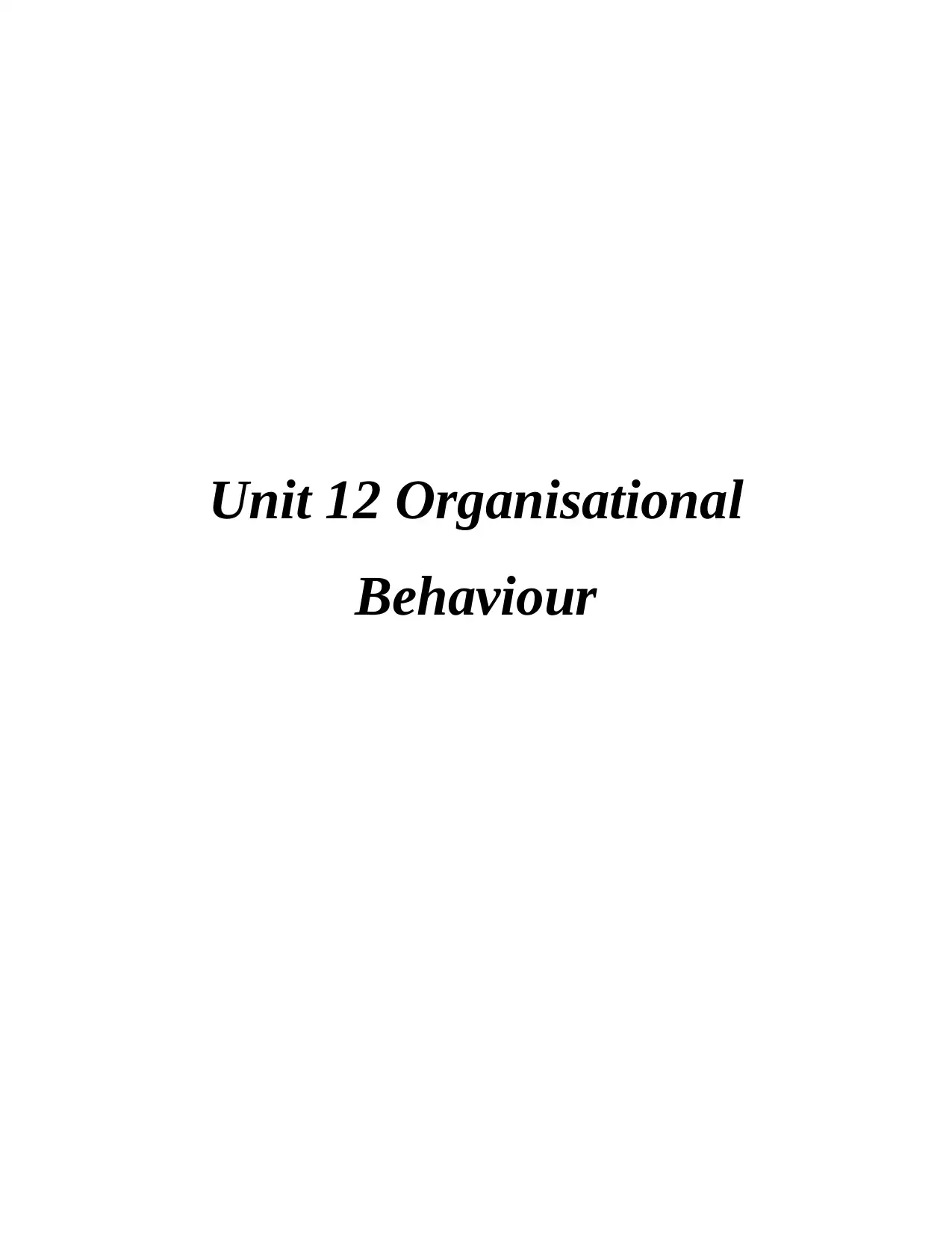
Unit 12 Organisational
Behaviour
Behaviour
Paraphrase This Document
Need a fresh take? Get an instant paraphrase of this document with our AI Paraphraser
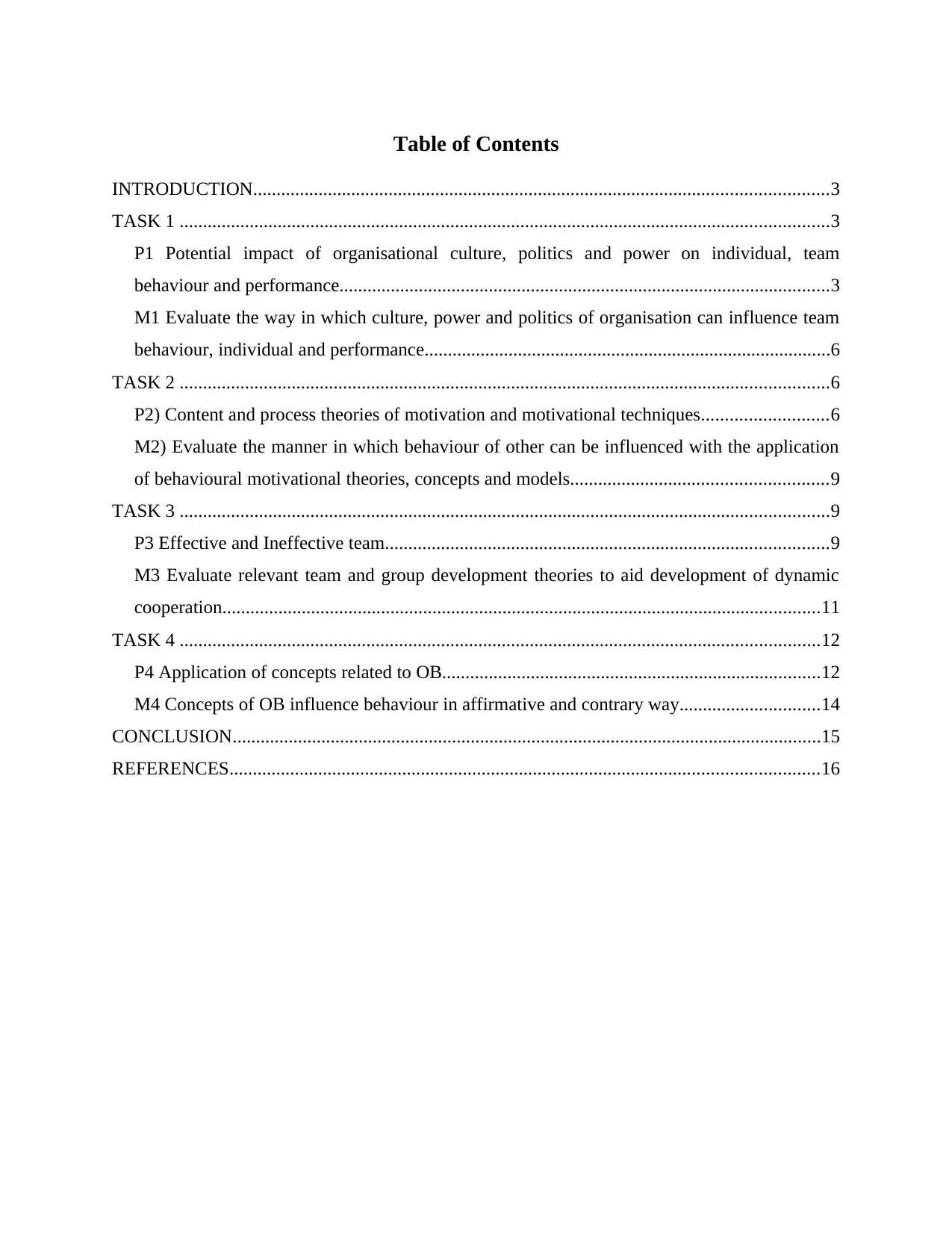
Table of Contents
INTRODUCTION...........................................................................................................................3
TASK 1 ...........................................................................................................................................3
P1 Potential impact of organisational culture, politics and power on individual, team
behaviour and performance.........................................................................................................3
M1 Evaluate the way in which culture, power and politics of organisation can influence team
behaviour, individual and performance.......................................................................................6
TASK 2 ...........................................................................................................................................6
P2) Content and process theories of motivation and motivational techniques...........................6
M2) Evaluate the manner in which behaviour of other can be influenced with the application
of behavioural motivational theories, concepts and models.......................................................9
TASK 3 ...........................................................................................................................................9
P3 Effective and Ineffective team...............................................................................................9
M3 Evaluate relevant team and group development theories to aid development of dynamic
cooperation................................................................................................................................11
TASK 4 .........................................................................................................................................12
P4 Application of concepts related to OB.................................................................................12
M4 Concepts of OB influence behaviour in affirmative and contrary way..............................14
CONCLUSION..............................................................................................................................15
REFERENCES..............................................................................................................................16
INTRODUCTION...........................................................................................................................3
TASK 1 ...........................................................................................................................................3
P1 Potential impact of organisational culture, politics and power on individual, team
behaviour and performance.........................................................................................................3
M1 Evaluate the way in which culture, power and politics of organisation can influence team
behaviour, individual and performance.......................................................................................6
TASK 2 ...........................................................................................................................................6
P2) Content and process theories of motivation and motivational techniques...........................6
M2) Evaluate the manner in which behaviour of other can be influenced with the application
of behavioural motivational theories, concepts and models.......................................................9
TASK 3 ...........................................................................................................................................9
P3 Effective and Ineffective team...............................................................................................9
M3 Evaluate relevant team and group development theories to aid development of dynamic
cooperation................................................................................................................................11
TASK 4 .........................................................................................................................................12
P4 Application of concepts related to OB.................................................................................12
M4 Concepts of OB influence behaviour in affirmative and contrary way..............................14
CONCLUSION..............................................................................................................................15
REFERENCES..............................................................................................................................16
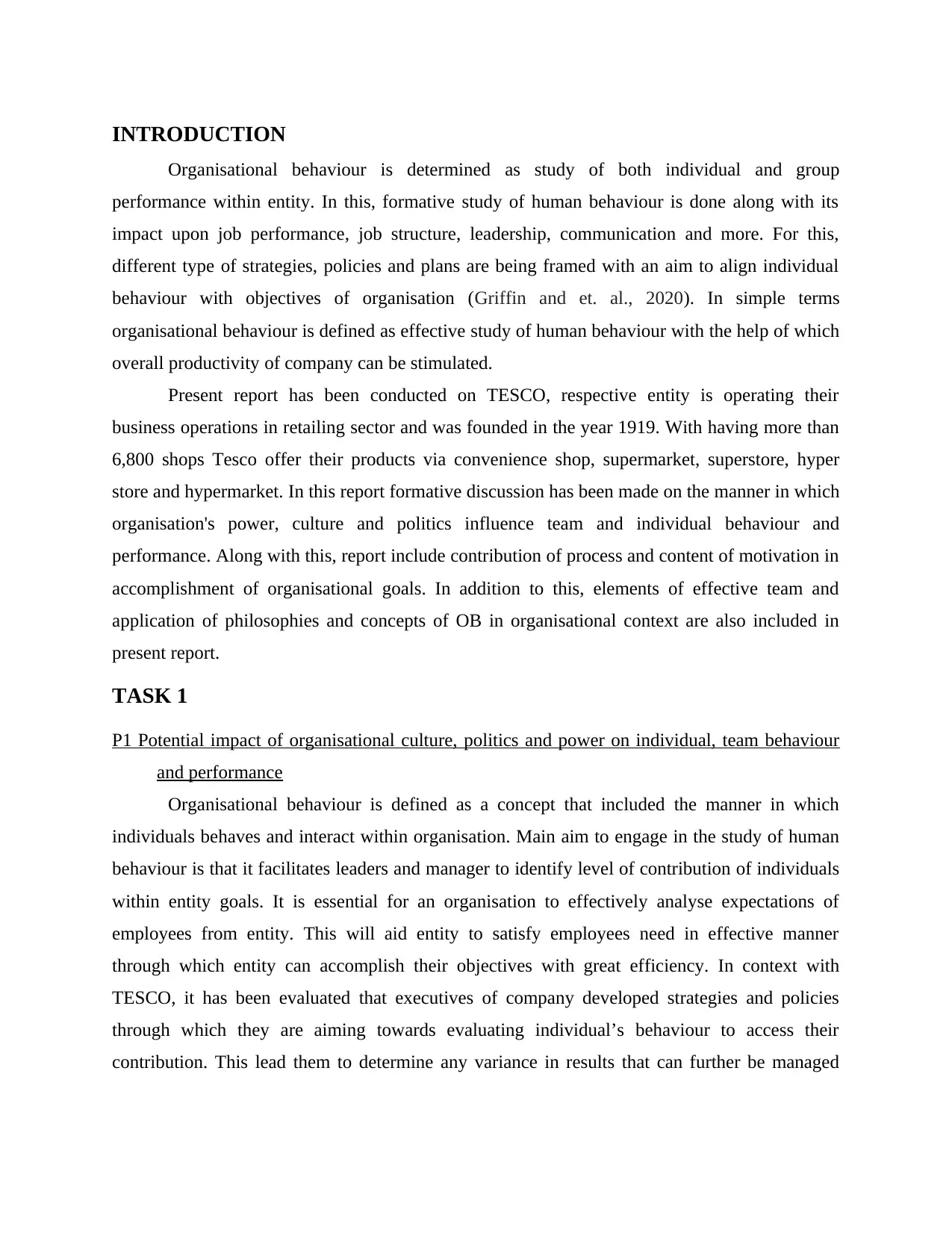
INTRODUCTION
Organisational behaviour is determined as study of both individual and group
performance within entity. In this, formative study of human behaviour is done along with its
impact upon job performance, job structure, leadership, communication and more. For this,
different type of strategies, policies and plans are being framed with an aim to align individual
behaviour with objectives of organisation (Griffin and et. al., 2020). In simple terms
organisational behaviour is defined as effective study of human behaviour with the help of which
overall productivity of company can be stimulated.
Present report has been conducted on TESCO, respective entity is operating their
business operations in retailing sector and was founded in the year 1919. With having more than
6,800 shops Tesco offer their products via convenience shop, supermarket, superstore, hyper
store and hypermarket. In this report formative discussion has been made on the manner in which
organisation's power, culture and politics influence team and individual behaviour and
performance. Along with this, report include contribution of process and content of motivation in
accomplishment of organisational goals. In addition to this, elements of effective team and
application of philosophies and concepts of OB in organisational context are also included in
present report.
TASK 1
P1 Potential impact of organisational culture, politics and power on individual, team behaviour
and performance
Organisational behaviour is defined as a concept that included the manner in which
individuals behaves and interact within organisation. Main aim to engage in the study of human
behaviour is that it facilitates leaders and manager to identify level of contribution of individuals
within entity goals. It is essential for an organisation to effectively analyse expectations of
employees from entity. This will aid entity to satisfy employees need in effective manner
through which entity can accomplish their objectives with great efficiency. In context with
TESCO, it has been evaluated that executives of company developed strategies and policies
through which they are aiming towards evaluating individual’s behaviour to access their
contribution. This lead them to determine any variance in results that can further be managed
Organisational behaviour is determined as study of both individual and group
performance within entity. In this, formative study of human behaviour is done along with its
impact upon job performance, job structure, leadership, communication and more. For this,
different type of strategies, policies and plans are being framed with an aim to align individual
behaviour with objectives of organisation (Griffin and et. al., 2020). In simple terms
organisational behaviour is defined as effective study of human behaviour with the help of which
overall productivity of company can be stimulated.
Present report has been conducted on TESCO, respective entity is operating their
business operations in retailing sector and was founded in the year 1919. With having more than
6,800 shops Tesco offer their products via convenience shop, supermarket, superstore, hyper
store and hypermarket. In this report formative discussion has been made on the manner in which
organisation's power, culture and politics influence team and individual behaviour and
performance. Along with this, report include contribution of process and content of motivation in
accomplishment of organisational goals. In addition to this, elements of effective team and
application of philosophies and concepts of OB in organisational context are also included in
present report.
TASK 1
P1 Potential impact of organisational culture, politics and power on individual, team behaviour
and performance
Organisational behaviour is defined as a concept that included the manner in which
individuals behaves and interact within organisation. Main aim to engage in the study of human
behaviour is that it facilitates leaders and manager to identify level of contribution of individuals
within entity goals. It is essential for an organisation to effectively analyse expectations of
employees from entity. This will aid entity to satisfy employees need in effective manner
through which entity can accomplish their objectives with great efficiency. In context with
TESCO, it has been evaluated that executives of company developed strategies and policies
through which they are aiming towards evaluating individual’s behaviour to access their
contribution. This lead them to determine any variance in results that can further be managed
⊘ This is a preview!⊘
Do you want full access?
Subscribe today to unlock all pages.

Trusted by 1+ million students worldwide
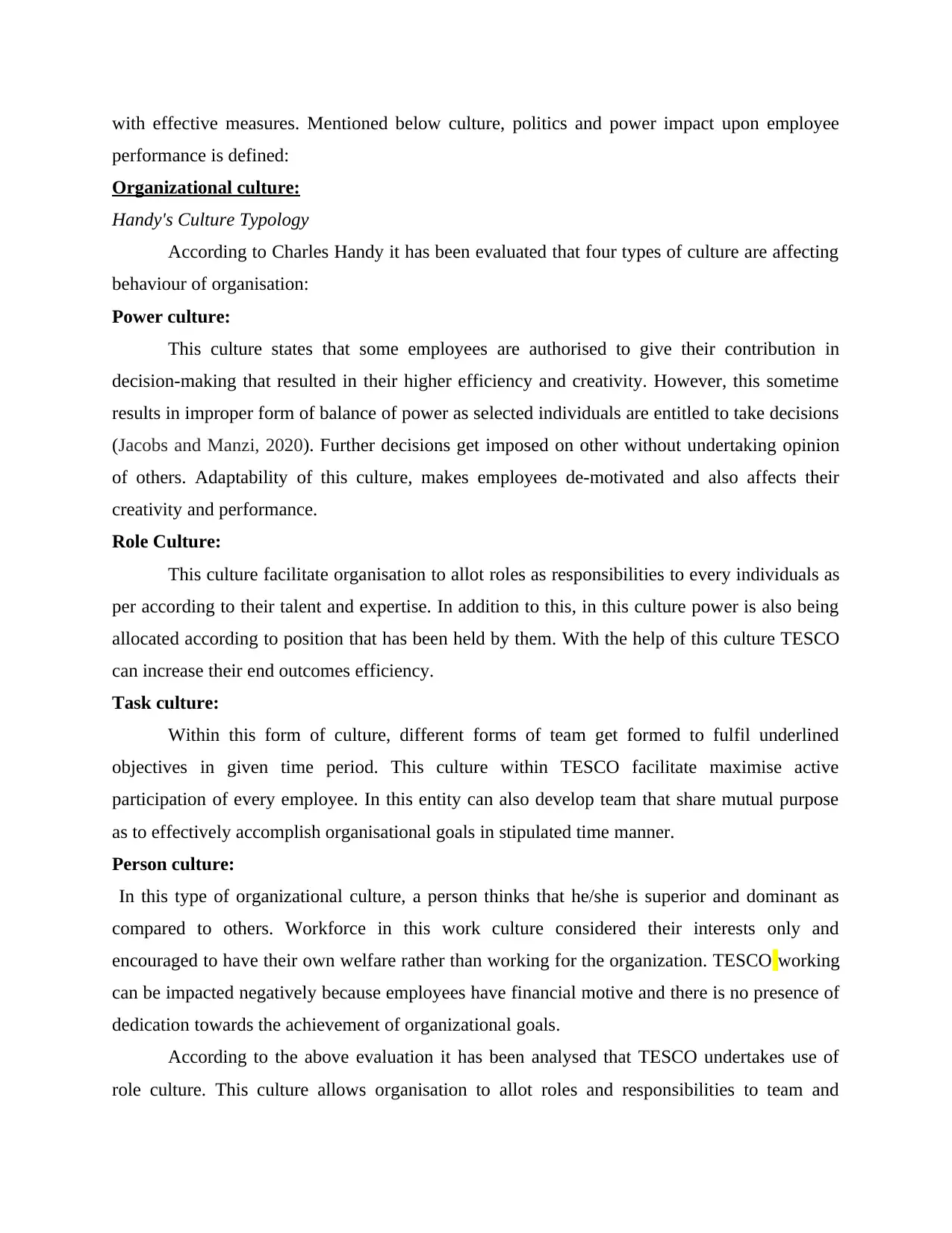
with effective measures. Mentioned below culture, politics and power impact upon employee
performance is defined:
Organizational culture:
Handy's Culture Typology
According to Charles Handy it has been evaluated that four types of culture are affecting
behaviour of organisation:
Power culture:
This culture states that some employees are authorised to give their contribution in
decision-making that resulted in their higher efficiency and creativity. However, this sometime
results in improper form of balance of power as selected individuals are entitled to take decisions
(Jacobs and Manzi, 2020). Further decisions get imposed on other without undertaking opinion
of others. Adaptability of this culture, makes employees de-motivated and also affects their
creativity and performance.
Role Culture:
This culture facilitate organisation to allot roles as responsibilities to every individuals as
per according to their talent and expertise. In addition to this, in this culture power is also being
allocated according to position that has been held by them. With the help of this culture TESCO
can increase their end outcomes efficiency.
Task culture:
Within this form of culture, different forms of team get formed to fulfil underlined
objectives in given time period. This culture within TESCO facilitate maximise active
participation of every employee. In this entity can also develop team that share mutual purpose
as to effectively accomplish organisational goals in stipulated time manner.
Person culture:
In this type of organizational culture, a person thinks that he/she is superior and dominant as
compared to others. Workforce in this work culture considered their interests only and
encouraged to have their own welfare rather than working for the organization. TESCO working
can be impacted negatively because employees have financial motive and there is no presence of
dedication towards the achievement of organizational goals.
According to the above evaluation it has been analysed that TESCO undertakes use of
role culture. This culture allows organisation to allot roles and responsibilities to team and
performance is defined:
Organizational culture:
Handy's Culture Typology
According to Charles Handy it has been evaluated that four types of culture are affecting
behaviour of organisation:
Power culture:
This culture states that some employees are authorised to give their contribution in
decision-making that resulted in their higher efficiency and creativity. However, this sometime
results in improper form of balance of power as selected individuals are entitled to take decisions
(Jacobs and Manzi, 2020). Further decisions get imposed on other without undertaking opinion
of others. Adaptability of this culture, makes employees de-motivated and also affects their
creativity and performance.
Role Culture:
This culture facilitate organisation to allot roles as responsibilities to every individuals as
per according to their talent and expertise. In addition to this, in this culture power is also being
allocated according to position that has been held by them. With the help of this culture TESCO
can increase their end outcomes efficiency.
Task culture:
Within this form of culture, different forms of team get formed to fulfil underlined
objectives in given time period. This culture within TESCO facilitate maximise active
participation of every employee. In this entity can also develop team that share mutual purpose
as to effectively accomplish organisational goals in stipulated time manner.
Person culture:
In this type of organizational culture, a person thinks that he/she is superior and dominant as
compared to others. Workforce in this work culture considered their interests only and
encouraged to have their own welfare rather than working for the organization. TESCO working
can be impacted negatively because employees have financial motive and there is no presence of
dedication towards the achievement of organizational goals.
According to the above evaluation it has been analysed that TESCO undertakes use of
role culture. This culture allows organisation to allot roles and responsibilities to team and
Paraphrase This Document
Need a fresh take? Get an instant paraphrase of this document with our AI Paraphraser
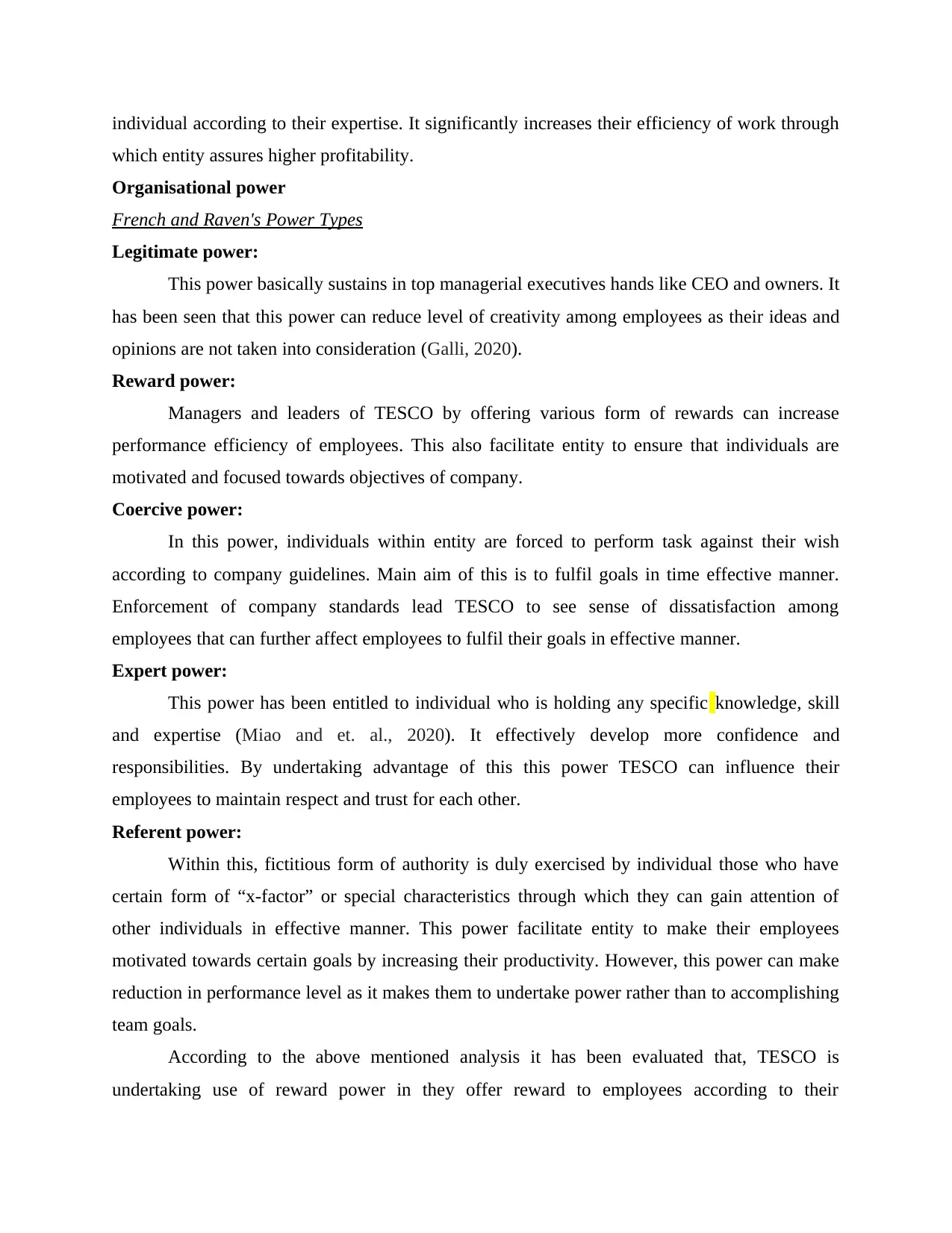
individual according to their expertise. It significantly increases their efficiency of work through
which entity assures higher profitability.
Organisational power
French and Raven's Power Types
Legitimate power:
This power basically sustains in top managerial executives hands like CEO and owners. It
has been seen that this power can reduce level of creativity among employees as their ideas and
opinions are not taken into consideration (Galli, 2020).
Reward power:
Managers and leaders of TESCO by offering various form of rewards can increase
performance efficiency of employees. This also facilitate entity to ensure that individuals are
motivated and focused towards objectives of company.
Coercive power:
In this power, individuals within entity are forced to perform task against their wish
according to company guidelines. Main aim of this is to fulfil goals in time effective manner.
Enforcement of company standards lead TESCO to see sense of dissatisfaction among
employees that can further affect employees to fulfil their goals in effective manner.
Expert power:
This power has been entitled to individual who is holding any specific knowledge, skill
and expertise (Miao and et. al., 2020). It effectively develop more confidence and
responsibilities. By undertaking advantage of this this power TESCO can influence their
employees to maintain respect and trust for each other.
Referent power:
Within this, fictitious form of authority is duly exercised by individual those who have
certain form of “x-factor” or special characteristics through which they can gain attention of
other individuals in effective manner. This power facilitate entity to make their employees
motivated towards certain goals by increasing their productivity. However, this power can make
reduction in performance level as it makes them to undertake power rather than to accomplishing
team goals.
According to the above mentioned analysis it has been evaluated that, TESCO is
undertaking use of reward power in they offer reward to employees according to their
which entity assures higher profitability.
Organisational power
French and Raven's Power Types
Legitimate power:
This power basically sustains in top managerial executives hands like CEO and owners. It
has been seen that this power can reduce level of creativity among employees as their ideas and
opinions are not taken into consideration (Galli, 2020).
Reward power:
Managers and leaders of TESCO by offering various form of rewards can increase
performance efficiency of employees. This also facilitate entity to ensure that individuals are
motivated and focused towards objectives of company.
Coercive power:
In this power, individuals within entity are forced to perform task against their wish
according to company guidelines. Main aim of this is to fulfil goals in time effective manner.
Enforcement of company standards lead TESCO to see sense of dissatisfaction among
employees that can further affect employees to fulfil their goals in effective manner.
Expert power:
This power has been entitled to individual who is holding any specific knowledge, skill
and expertise (Miao and et. al., 2020). It effectively develop more confidence and
responsibilities. By undertaking advantage of this this power TESCO can influence their
employees to maintain respect and trust for each other.
Referent power:
Within this, fictitious form of authority is duly exercised by individual those who have
certain form of “x-factor” or special characteristics through which they can gain attention of
other individuals in effective manner. This power facilitate entity to make their employees
motivated towards certain goals by increasing their productivity. However, this power can make
reduction in performance level as it makes them to undertake power rather than to accomplishing
team goals.
According to the above mentioned analysis it has been evaluated that, TESCO is
undertaking use of reward power in they offer reward to employees according to their
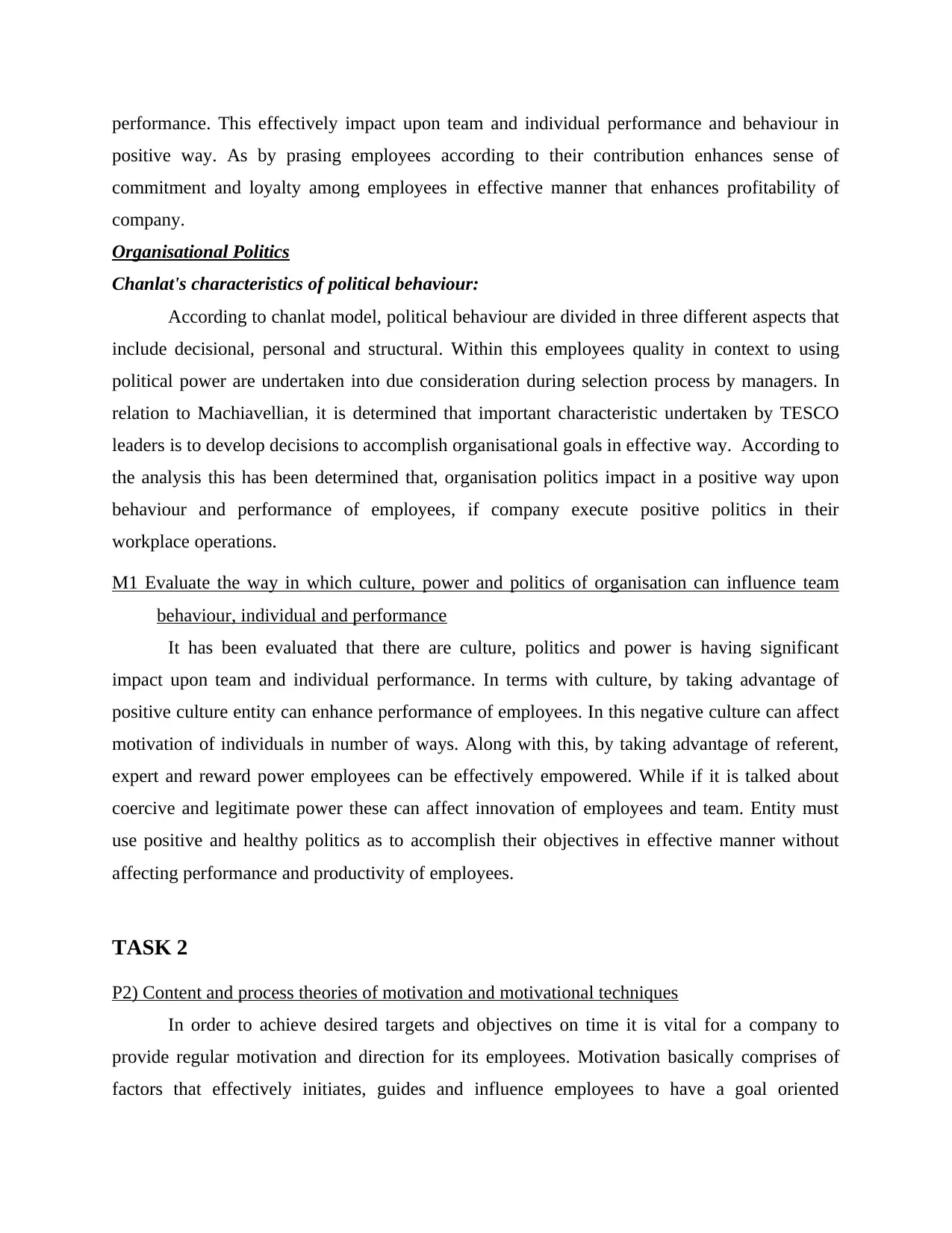
performance. This effectively impact upon team and individual performance and behaviour in
positive way. As by prasing employees according to their contribution enhances sense of
commitment and loyalty among employees in effective manner that enhances profitability of
company.
Organisational Politics
Chanlat's characteristics of political behaviour:
According to chanlat model, political behaviour are divided in three different aspects that
include decisional, personal and structural. Within this employees quality in context to using
political power are undertaken into due consideration during selection process by managers. In
relation to Machiavellian, it is determined that important characteristic undertaken by TESCO
leaders is to develop decisions to accomplish organisational goals in effective way. According to
the analysis this has been determined that, organisation politics impact in a positive way upon
behaviour and performance of employees, if company execute positive politics in their
workplace operations.
M1 Evaluate the way in which culture, power and politics of organisation can influence team
behaviour, individual and performance
It has been evaluated that there are culture, politics and power is having significant
impact upon team and individual performance. In terms with culture, by taking advantage of
positive culture entity can enhance performance of employees. In this negative culture can affect
motivation of individuals in number of ways. Along with this, by taking advantage of referent,
expert and reward power employees can be effectively empowered. While if it is talked about
coercive and legitimate power these can affect innovation of employees and team. Entity must
use positive and healthy politics as to accomplish their objectives in effective manner without
affecting performance and productivity of employees.
TASK 2
P2) Content and process theories of motivation and motivational techniques
In order to achieve desired targets and objectives on time it is vital for a company to
provide regular motivation and direction for its employees. Motivation basically comprises of
factors that effectively initiates, guides and influence employees to have a goal oriented
positive way. As by prasing employees according to their contribution enhances sense of
commitment and loyalty among employees in effective manner that enhances profitability of
company.
Organisational Politics
Chanlat's characteristics of political behaviour:
According to chanlat model, political behaviour are divided in three different aspects that
include decisional, personal and structural. Within this employees quality in context to using
political power are undertaken into due consideration during selection process by managers. In
relation to Machiavellian, it is determined that important characteristic undertaken by TESCO
leaders is to develop decisions to accomplish organisational goals in effective way. According to
the analysis this has been determined that, organisation politics impact in a positive way upon
behaviour and performance of employees, if company execute positive politics in their
workplace operations.
M1 Evaluate the way in which culture, power and politics of organisation can influence team
behaviour, individual and performance
It has been evaluated that there are culture, politics and power is having significant
impact upon team and individual performance. In terms with culture, by taking advantage of
positive culture entity can enhance performance of employees. In this negative culture can affect
motivation of individuals in number of ways. Along with this, by taking advantage of referent,
expert and reward power employees can be effectively empowered. While if it is talked about
coercive and legitimate power these can affect innovation of employees and team. Entity must
use positive and healthy politics as to accomplish their objectives in effective manner without
affecting performance and productivity of employees.
TASK 2
P2) Content and process theories of motivation and motivational techniques
In order to achieve desired targets and objectives on time it is vital for a company to
provide regular motivation and direction for its employees. Motivation basically comprises of
factors that effectively initiates, guides and influence employees to have a goal oriented
⊘ This is a preview!⊘
Do you want full access?
Subscribe today to unlock all pages.

Trusted by 1+ million students worldwide
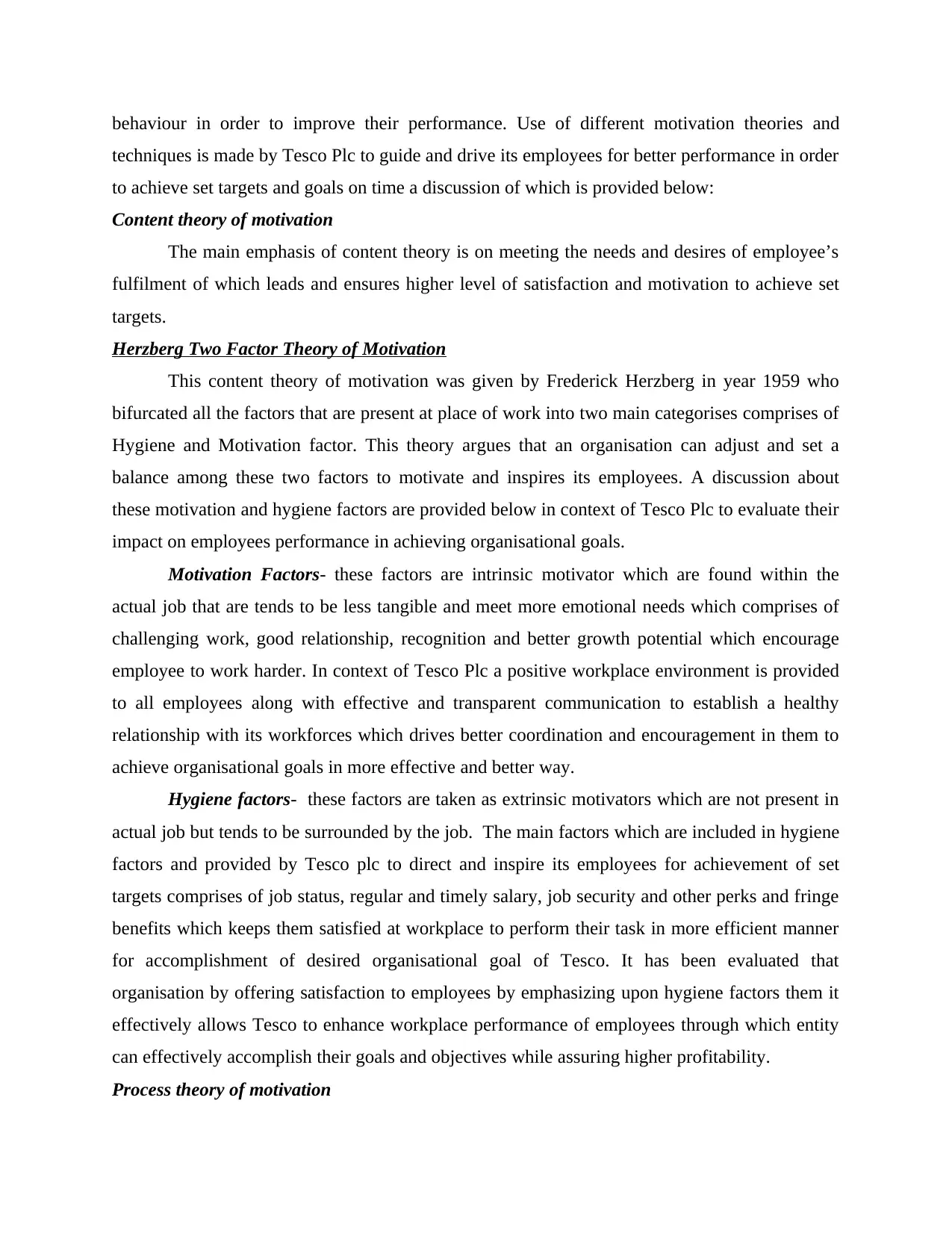
behaviour in order to improve their performance. Use of different motivation theories and
techniques is made by Tesco Plc to guide and drive its employees for better performance in order
to achieve set targets and goals on time a discussion of which is provided below:
Content theory of motivation
The main emphasis of content theory is on meeting the needs and desires of employee’s
fulfilment of which leads and ensures higher level of satisfaction and motivation to achieve set
targets.
Herzberg Two Factor Theory of Motivation
This content theory of motivation was given by Frederick Herzberg in year 1959 who
bifurcated all the factors that are present at place of work into two main categorises comprises of
Hygiene and Motivation factor. This theory argues that an organisation can adjust and set a
balance among these two factors to motivate and inspires its employees. A discussion about
these motivation and hygiene factors are provided below in context of Tesco Plc to evaluate their
impact on employees performance in achieving organisational goals.
Motivation Factors- these factors are intrinsic motivator which are found within the
actual job that are tends to be less tangible and meet more emotional needs which comprises of
challenging work, good relationship, recognition and better growth potential which encourage
employee to work harder. In context of Tesco Plc a positive workplace environment is provided
to all employees along with effective and transparent communication to establish a healthy
relationship with its workforces which drives better coordination and encouragement in them to
achieve organisational goals in more effective and better way.
Hygiene factors- these factors are taken as extrinsic motivators which are not present in
actual job but tends to be surrounded by the job. The main factors which are included in hygiene
factors and provided by Tesco plc to direct and inspire its employees for achievement of set
targets comprises of job status, regular and timely salary, job security and other perks and fringe
benefits which keeps them satisfied at workplace to perform their task in more efficient manner
for accomplishment of desired organisational goal of Tesco. It has been evaluated that
organisation by offering satisfaction to employees by emphasizing upon hygiene factors them it
effectively allows Tesco to enhance workplace performance of employees through which entity
can effectively accomplish their goals and objectives while assuring higher profitability.
Process theory of motivation
techniques is made by Tesco Plc to guide and drive its employees for better performance in order
to achieve set targets and goals on time a discussion of which is provided below:
Content theory of motivation
The main emphasis of content theory is on meeting the needs and desires of employee’s
fulfilment of which leads and ensures higher level of satisfaction and motivation to achieve set
targets.
Herzberg Two Factor Theory of Motivation
This content theory of motivation was given by Frederick Herzberg in year 1959 who
bifurcated all the factors that are present at place of work into two main categorises comprises of
Hygiene and Motivation factor. This theory argues that an organisation can adjust and set a
balance among these two factors to motivate and inspires its employees. A discussion about
these motivation and hygiene factors are provided below in context of Tesco Plc to evaluate their
impact on employees performance in achieving organisational goals.
Motivation Factors- these factors are intrinsic motivator which are found within the
actual job that are tends to be less tangible and meet more emotional needs which comprises of
challenging work, good relationship, recognition and better growth potential which encourage
employee to work harder. In context of Tesco Plc a positive workplace environment is provided
to all employees along with effective and transparent communication to establish a healthy
relationship with its workforces which drives better coordination and encouragement in them to
achieve organisational goals in more effective and better way.
Hygiene factors- these factors are taken as extrinsic motivators which are not present in
actual job but tends to be surrounded by the job. The main factors which are included in hygiene
factors and provided by Tesco plc to direct and inspire its employees for achievement of set
targets comprises of job status, regular and timely salary, job security and other perks and fringe
benefits which keeps them satisfied at workplace to perform their task in more efficient manner
for accomplishment of desired organisational goal of Tesco. It has been evaluated that
organisation by offering satisfaction to employees by emphasizing upon hygiene factors them it
effectively allows Tesco to enhance workplace performance of employees through which entity
can effectively accomplish their goals and objectives while assuring higher profitability.
Process theory of motivation
Paraphrase This Document
Need a fresh take? Get an instant paraphrase of this document with our AI Paraphraser
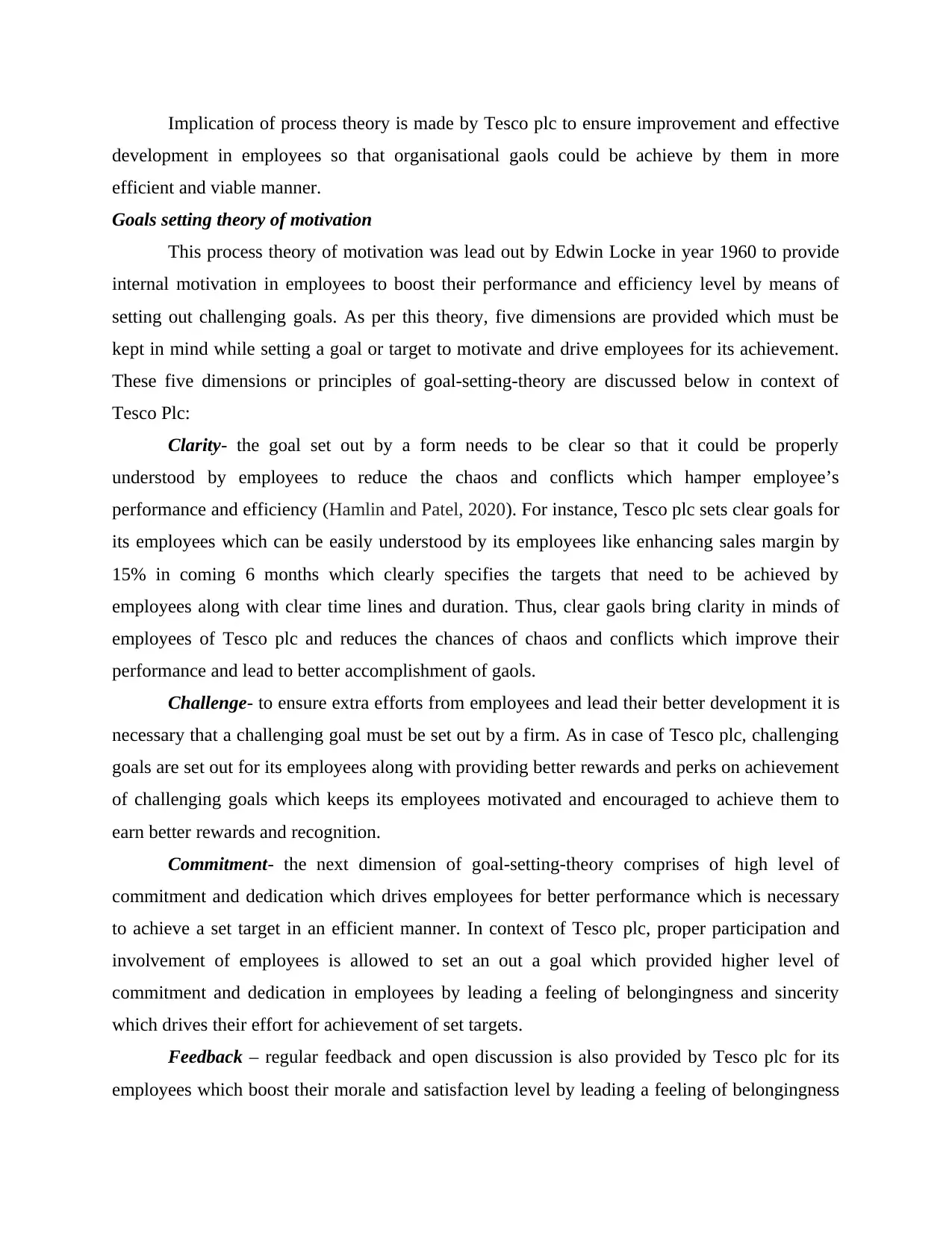
Implication of process theory is made by Tesco plc to ensure improvement and effective
development in employees so that organisational gaols could be achieve by them in more
efficient and viable manner.
Goals setting theory of motivation
This process theory of motivation was lead out by Edwin Locke in year 1960 to provide
internal motivation in employees to boost their performance and efficiency level by means of
setting out challenging goals. As per this theory, five dimensions are provided which must be
kept in mind while setting a goal or target to motivate and drive employees for its achievement.
These five dimensions or principles of goal-setting-theory are discussed below in context of
Tesco Plc:
Clarity- the goal set out by a form needs to be clear so that it could be properly
understood by employees to reduce the chaos and conflicts which hamper employee’s
performance and efficiency (Hamlin and Patel, 2020). For instance, Tesco plc sets clear goals for
its employees which can be easily understood by its employees like enhancing sales margin by
15% in coming 6 months which clearly specifies the targets that need to be achieved by
employees along with clear time lines and duration. Thus, clear gaols bring clarity in minds of
employees of Tesco plc and reduces the chances of chaos and conflicts which improve their
performance and lead to better accomplishment of gaols.
Challenge- to ensure extra efforts from employees and lead their better development it is
necessary that a challenging goal must be set out by a firm. As in case of Tesco plc, challenging
goals are set out for its employees along with providing better rewards and perks on achievement
of challenging goals which keeps its employees motivated and encouraged to achieve them to
earn better rewards and recognition.
Commitment- the next dimension of goal-setting-theory comprises of high level of
commitment and dedication which drives employees for better performance which is necessary
to achieve a set target in an efficient manner. In context of Tesco plc, proper participation and
involvement of employees is allowed to set an out a goal which provided higher level of
commitment and dedication in employees by leading a feeling of belongingness and sincerity
which drives their effort for achievement of set targets.
Feedback – regular feedback and open discussion is also provided by Tesco plc for its
employees which boost their morale and satisfaction level by leading a feeling of belongingness
development in employees so that organisational gaols could be achieve by them in more
efficient and viable manner.
Goals setting theory of motivation
This process theory of motivation was lead out by Edwin Locke in year 1960 to provide
internal motivation in employees to boost their performance and efficiency level by means of
setting out challenging goals. As per this theory, five dimensions are provided which must be
kept in mind while setting a goal or target to motivate and drive employees for its achievement.
These five dimensions or principles of goal-setting-theory are discussed below in context of
Tesco Plc:
Clarity- the goal set out by a form needs to be clear so that it could be properly
understood by employees to reduce the chaos and conflicts which hamper employee’s
performance and efficiency (Hamlin and Patel, 2020). For instance, Tesco plc sets clear goals for
its employees which can be easily understood by its employees like enhancing sales margin by
15% in coming 6 months which clearly specifies the targets that need to be achieved by
employees along with clear time lines and duration. Thus, clear gaols bring clarity in minds of
employees of Tesco plc and reduces the chances of chaos and conflicts which improve their
performance and lead to better accomplishment of gaols.
Challenge- to ensure extra efforts from employees and lead their better development it is
necessary that a challenging goal must be set out by a firm. As in case of Tesco plc, challenging
goals are set out for its employees along with providing better rewards and perks on achievement
of challenging goals which keeps its employees motivated and encouraged to achieve them to
earn better rewards and recognition.
Commitment- the next dimension of goal-setting-theory comprises of high level of
commitment and dedication which drives employees for better performance which is necessary
to achieve a set target in an efficient manner. In context of Tesco plc, proper participation and
involvement of employees is allowed to set an out a goal which provided higher level of
commitment and dedication in employees by leading a feeling of belongingness and sincerity
which drives their effort for achievement of set targets.
Feedback – regular feedback and open discussion is also provided by Tesco plc for its
employees which boost their morale and satisfaction level by leading a feeling of belongingness
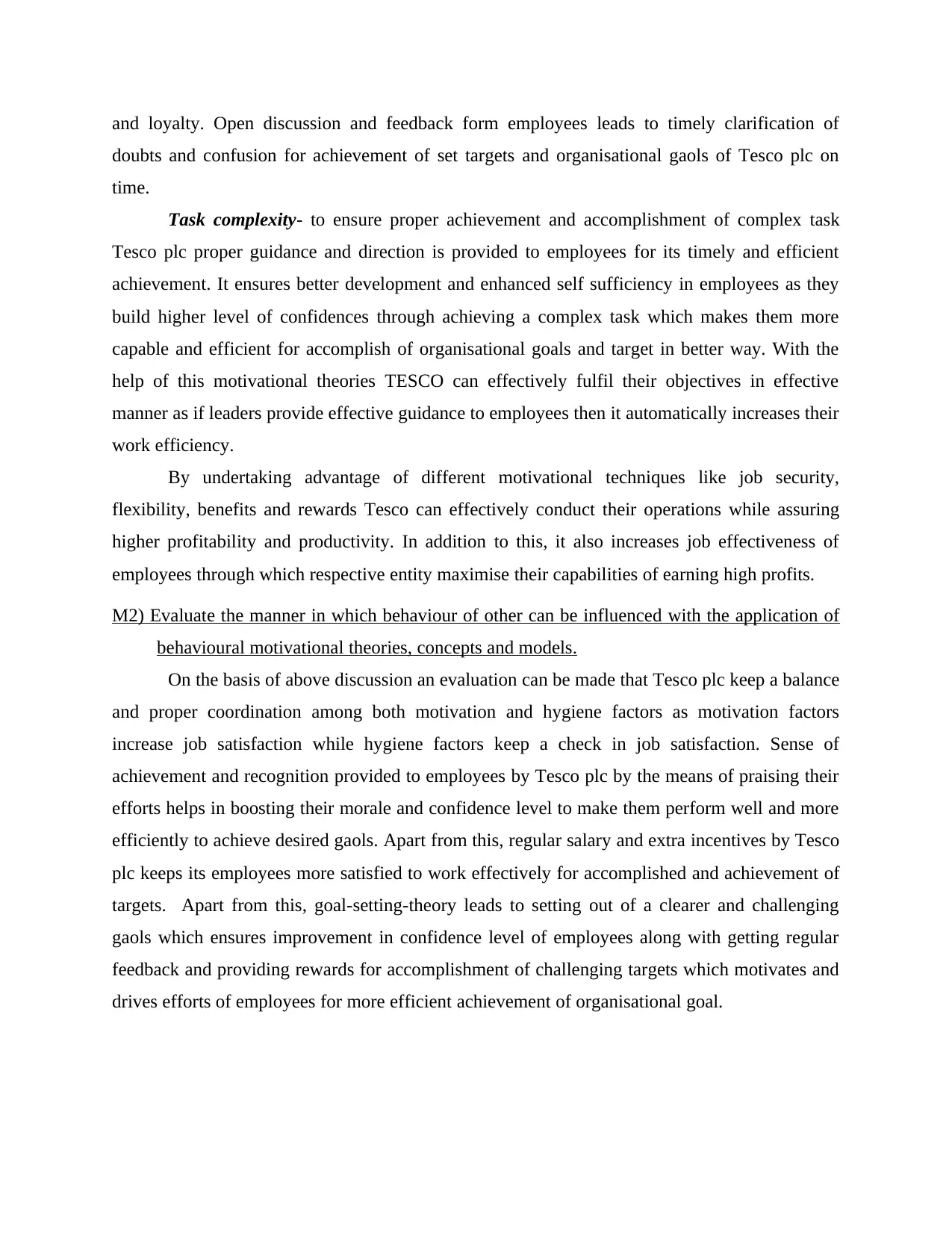
and loyalty. Open discussion and feedback form employees leads to timely clarification of
doubts and confusion for achievement of set targets and organisational gaols of Tesco plc on
time.
Task complexity- to ensure proper achievement and accomplishment of complex task
Tesco plc proper guidance and direction is provided to employees for its timely and efficient
achievement. It ensures better development and enhanced self sufficiency in employees as they
build higher level of confidences through achieving a complex task which makes them more
capable and efficient for accomplish of organisational goals and target in better way. With the
help of this motivational theories TESCO can effectively fulfil their objectives in effective
manner as if leaders provide effective guidance to employees then it automatically increases their
work efficiency.
By undertaking advantage of different motivational techniques like job security,
flexibility, benefits and rewards Tesco can effectively conduct their operations while assuring
higher profitability and productivity. In addition to this, it also increases job effectiveness of
employees through which respective entity maximise their capabilities of earning high profits.
M2) Evaluate the manner in which behaviour of other can be influenced with the application of
behavioural motivational theories, concepts and models.
On the basis of above discussion an evaluation can be made that Tesco plc keep a balance
and proper coordination among both motivation and hygiene factors as motivation factors
increase job satisfaction while hygiene factors keep a check in job satisfaction. Sense of
achievement and recognition provided to employees by Tesco plc by the means of praising their
efforts helps in boosting their morale and confidence level to make them perform well and more
efficiently to achieve desired gaols. Apart from this, regular salary and extra incentives by Tesco
plc keeps its employees more satisfied to work effectively for accomplished and achievement of
targets. Apart from this, goal-setting-theory leads to setting out of a clearer and challenging
gaols which ensures improvement in confidence level of employees along with getting regular
feedback and providing rewards for accomplishment of challenging targets which motivates and
drives efforts of employees for more efficient achievement of organisational goal.
doubts and confusion for achievement of set targets and organisational gaols of Tesco plc on
time.
Task complexity- to ensure proper achievement and accomplishment of complex task
Tesco plc proper guidance and direction is provided to employees for its timely and efficient
achievement. It ensures better development and enhanced self sufficiency in employees as they
build higher level of confidences through achieving a complex task which makes them more
capable and efficient for accomplish of organisational goals and target in better way. With the
help of this motivational theories TESCO can effectively fulfil their objectives in effective
manner as if leaders provide effective guidance to employees then it automatically increases their
work efficiency.
By undertaking advantage of different motivational techniques like job security,
flexibility, benefits and rewards Tesco can effectively conduct their operations while assuring
higher profitability and productivity. In addition to this, it also increases job effectiveness of
employees through which respective entity maximise their capabilities of earning high profits.
M2) Evaluate the manner in which behaviour of other can be influenced with the application of
behavioural motivational theories, concepts and models.
On the basis of above discussion an evaluation can be made that Tesco plc keep a balance
and proper coordination among both motivation and hygiene factors as motivation factors
increase job satisfaction while hygiene factors keep a check in job satisfaction. Sense of
achievement and recognition provided to employees by Tesco plc by the means of praising their
efforts helps in boosting their morale and confidence level to make them perform well and more
efficiently to achieve desired gaols. Apart from this, regular salary and extra incentives by Tesco
plc keeps its employees more satisfied to work effectively for accomplished and achievement of
targets. Apart from this, goal-setting-theory leads to setting out of a clearer and challenging
gaols which ensures improvement in confidence level of employees along with getting regular
feedback and providing rewards for accomplishment of challenging targets which motivates and
drives efforts of employees for more efficient achievement of organisational goal.
⊘ This is a preview!⊘
Do you want full access?
Subscribe today to unlock all pages.

Trusted by 1+ million students worldwide
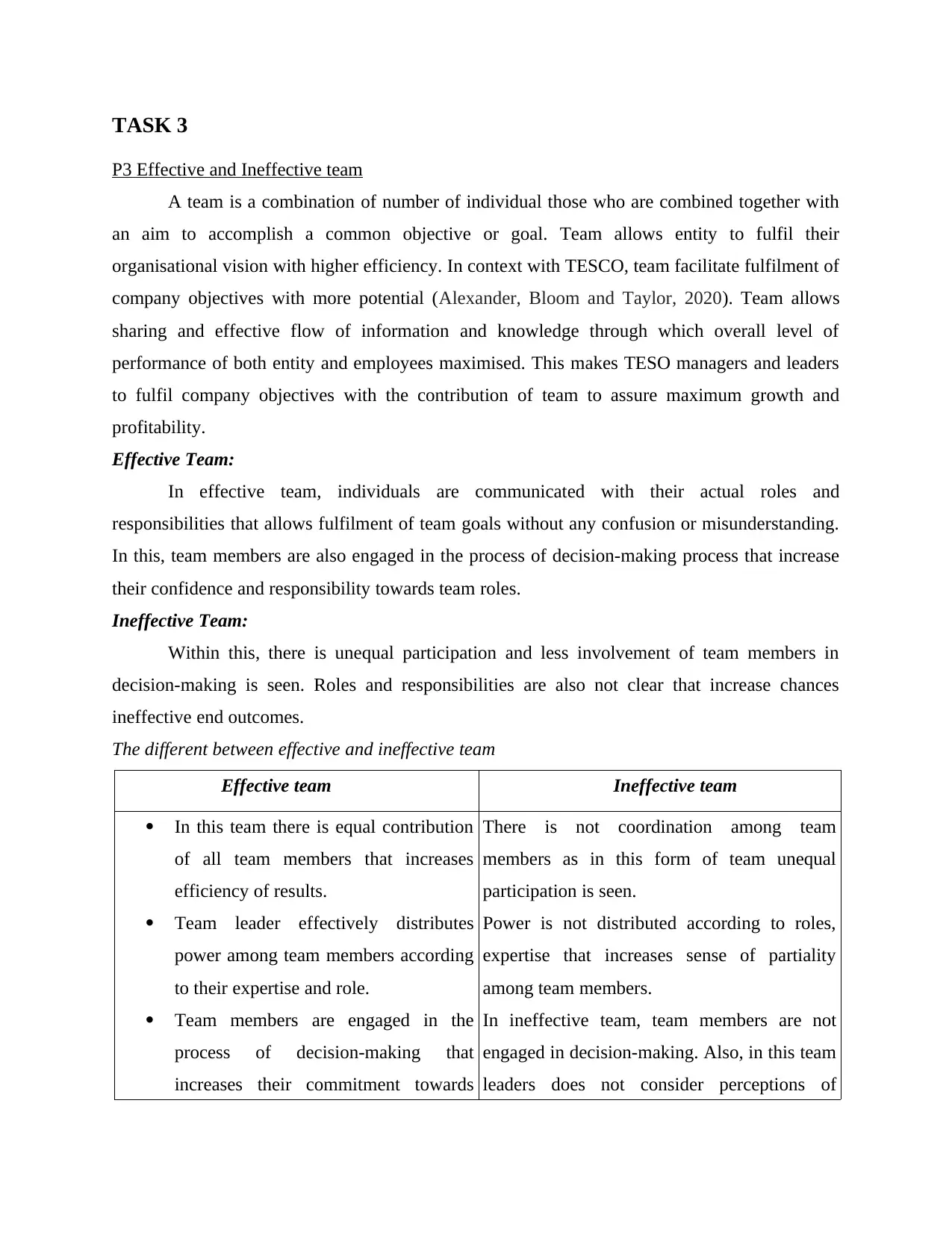
TASK 3
P3 Effective and Ineffective team
A team is a combination of number of individual those who are combined together with
an aim to accomplish a common objective or goal. Team allows entity to fulfil their
organisational vision with higher efficiency. In context with TESCO, team facilitate fulfilment of
company objectives with more potential (Alexander, Bloom and Taylor, 2020). Team allows
sharing and effective flow of information and knowledge through which overall level of
performance of both entity and employees maximised. This makes TESO managers and leaders
to fulfil company objectives with the contribution of team to assure maximum growth and
profitability.
Effective Team:
In effective team, individuals are communicated with their actual roles and
responsibilities that allows fulfilment of team goals without any confusion or misunderstanding.
In this, team members are also engaged in the process of decision-making process that increase
their confidence and responsibility towards team roles.
Ineffective Team:
Within this, there is unequal participation and less involvement of team members in
decision-making is seen. Roles and responsibilities are also not clear that increase chances
ineffective end outcomes.
The different between effective and ineffective team
Effective team Ineffective team
In this team there is equal contribution
of all team members that increases
efficiency of results.
Team leader effectively distributes
power among team members according
to their expertise and role.
Team members are engaged in the
process of decision-making that
increases their commitment towards
There is not coordination among team
members as in this form of team unequal
participation is seen.
Power is not distributed according to roles,
expertise that increases sense of partiality
among team members.
In ineffective team, team members are not
engaged in decision-making. Also, in this team
leaders does not consider perceptions of
P3 Effective and Ineffective team
A team is a combination of number of individual those who are combined together with
an aim to accomplish a common objective or goal. Team allows entity to fulfil their
organisational vision with higher efficiency. In context with TESCO, team facilitate fulfilment of
company objectives with more potential (Alexander, Bloom and Taylor, 2020). Team allows
sharing and effective flow of information and knowledge through which overall level of
performance of both entity and employees maximised. This makes TESO managers and leaders
to fulfil company objectives with the contribution of team to assure maximum growth and
profitability.
Effective Team:
In effective team, individuals are communicated with their actual roles and
responsibilities that allows fulfilment of team goals without any confusion or misunderstanding.
In this, team members are also engaged in the process of decision-making process that increase
their confidence and responsibility towards team roles.
Ineffective Team:
Within this, there is unequal participation and less involvement of team members in
decision-making is seen. Roles and responsibilities are also not clear that increase chances
ineffective end outcomes.
The different between effective and ineffective team
Effective team Ineffective team
In this team there is equal contribution
of all team members that increases
efficiency of results.
Team leader effectively distributes
power among team members according
to their expertise and role.
Team members are engaged in the
process of decision-making that
increases their commitment towards
There is not coordination among team
members as in this form of team unequal
participation is seen.
Power is not distributed according to roles,
expertise that increases sense of partiality
among team members.
In ineffective team, team members are not
engaged in decision-making. Also, in this team
leaders does not consider perceptions of
Paraphrase This Document
Need a fresh take? Get an instant paraphrase of this document with our AI Paraphraser
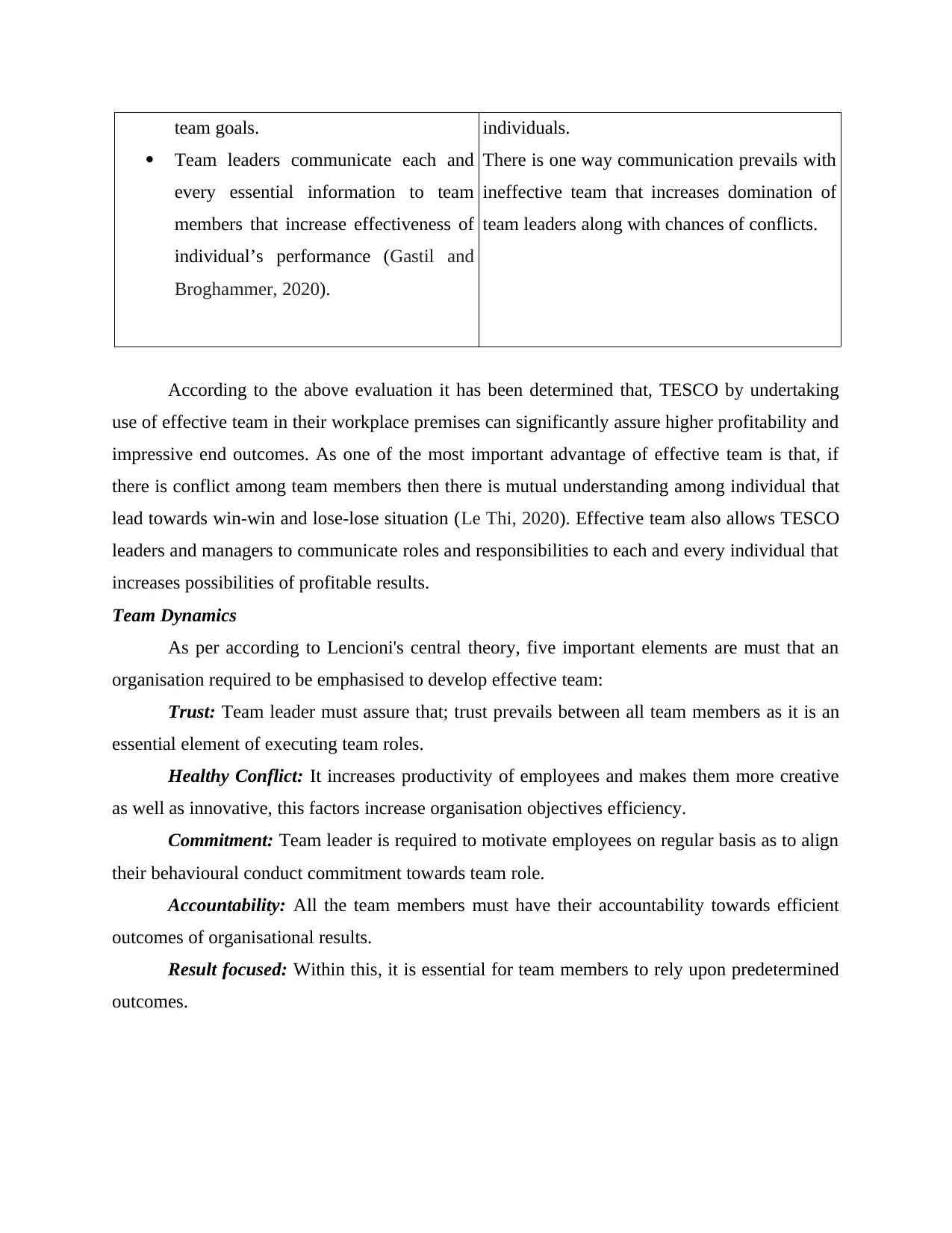
team goals.
Team leaders communicate each and
every essential information to team
members that increase effectiveness of
individual’s performance (Gastil and
Broghammer, 2020).
individuals.
There is one way communication prevails with
ineffective team that increases domination of
team leaders along with chances of conflicts.
According to the above evaluation it has been determined that, TESCO by undertaking
use of effective team in their workplace premises can significantly assure higher profitability and
impressive end outcomes. As one of the most important advantage of effective team is that, if
there is conflict among team members then there is mutual understanding among individual that
lead towards win-win and lose-lose situation (Le Thi, 2020). Effective team also allows TESCO
leaders and managers to communicate roles and responsibilities to each and every individual that
increases possibilities of profitable results.
Team Dynamics
As per according to Lencioni's central theory, five important elements are must that an
organisation required to be emphasised to develop effective team:
Trust: Team leader must assure that; trust prevails between all team members as it is an
essential element of executing team roles.
Healthy Conflict: It increases productivity of employees and makes them more creative
as well as innovative, this factors increase organisation objectives efficiency.
Commitment: Team leader is required to motivate employees on regular basis as to align
their behavioural conduct commitment towards team role.
Accountability: All the team members must have their accountability towards efficient
outcomes of organisational results.
Result focused: Within this, it is essential for team members to rely upon predetermined
outcomes.
Team leaders communicate each and
every essential information to team
members that increase effectiveness of
individual’s performance (Gastil and
Broghammer, 2020).
individuals.
There is one way communication prevails with
ineffective team that increases domination of
team leaders along with chances of conflicts.
According to the above evaluation it has been determined that, TESCO by undertaking
use of effective team in their workplace premises can significantly assure higher profitability and
impressive end outcomes. As one of the most important advantage of effective team is that, if
there is conflict among team members then there is mutual understanding among individual that
lead towards win-win and lose-lose situation (Le Thi, 2020). Effective team also allows TESCO
leaders and managers to communicate roles and responsibilities to each and every individual that
increases possibilities of profitable results.
Team Dynamics
As per according to Lencioni's central theory, five important elements are must that an
organisation required to be emphasised to develop effective team:
Trust: Team leader must assure that; trust prevails between all team members as it is an
essential element of executing team roles.
Healthy Conflict: It increases productivity of employees and makes them more creative
as well as innovative, this factors increase organisation objectives efficiency.
Commitment: Team leader is required to motivate employees on regular basis as to align
their behavioural conduct commitment towards team role.
Accountability: All the team members must have their accountability towards efficient
outcomes of organisational results.
Result focused: Within this, it is essential for team members to rely upon predetermined
outcomes.
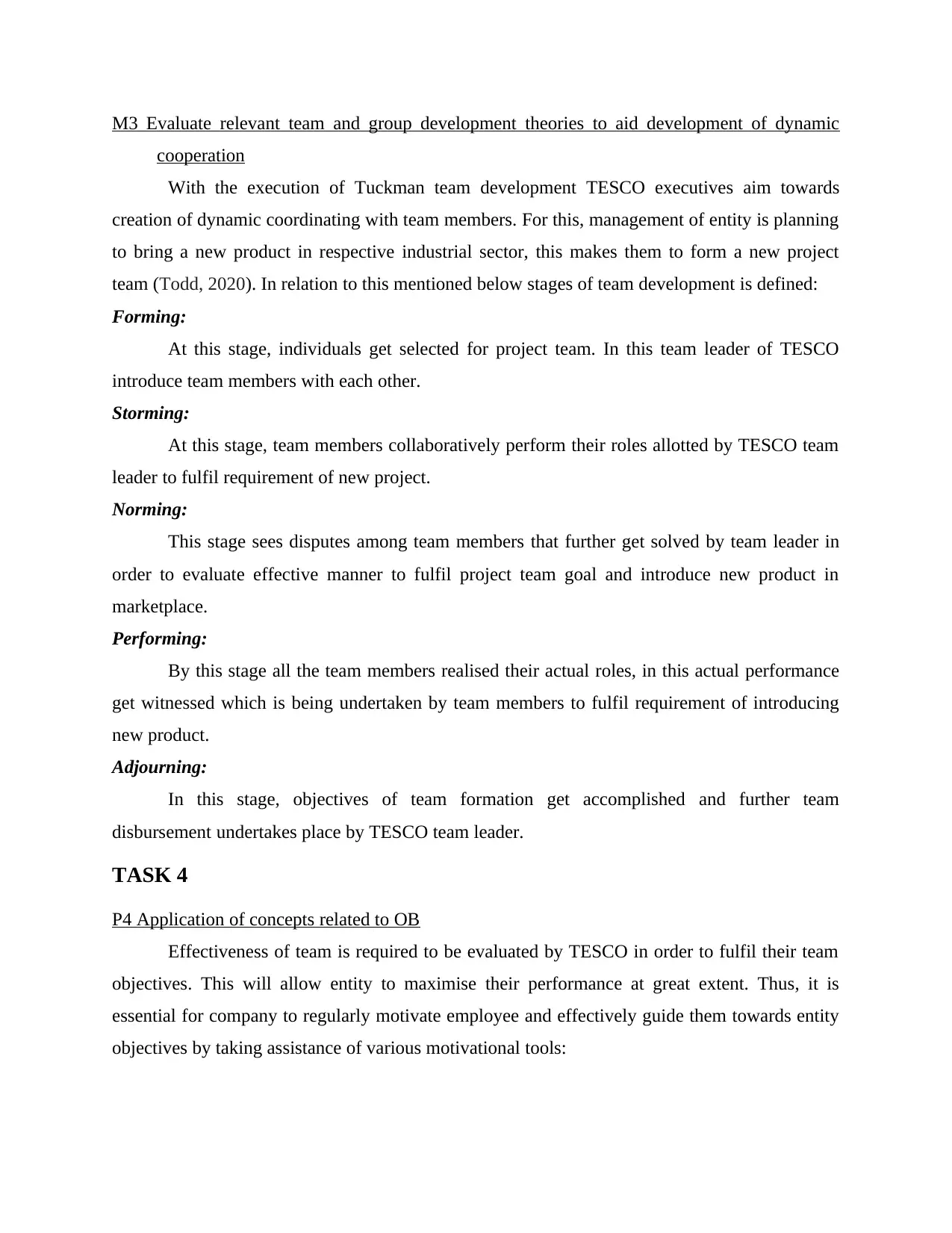
M3 Evaluate relevant team and group development theories to aid development of dynamic
cooperation
With the execution of Tuckman team development TESCO executives aim towards
creation of dynamic coordinating with team members. For this, management of entity is planning
to bring a new product in respective industrial sector, this makes them to form a new project
team (Todd, 2020). In relation to this mentioned below stages of team development is defined:
Forming:
At this stage, individuals get selected for project team. In this team leader of TESCO
introduce team members with each other.
Storming:
At this stage, team members collaboratively perform their roles allotted by TESCO team
leader to fulfil requirement of new project.
Norming:
This stage sees disputes among team members that further get solved by team leader in
order to evaluate effective manner to fulfil project team goal and introduce new product in
marketplace.
Performing:
By this stage all the team members realised their actual roles, in this actual performance
get witnessed which is being undertaken by team members to fulfil requirement of introducing
new product.
Adjourning:
In this stage, objectives of team formation get accomplished and further team
disbursement undertakes place by TESCO team leader.
TASK 4
P4 Application of concepts related to OB
Effectiveness of team is required to be evaluated by TESCO in order to fulfil their team
objectives. This will allow entity to maximise their performance at great extent. Thus, it is
essential for company to regularly motivate employee and effectively guide them towards entity
objectives by taking assistance of various motivational tools:
cooperation
With the execution of Tuckman team development TESCO executives aim towards
creation of dynamic coordinating with team members. For this, management of entity is planning
to bring a new product in respective industrial sector, this makes them to form a new project
team (Todd, 2020). In relation to this mentioned below stages of team development is defined:
Forming:
At this stage, individuals get selected for project team. In this team leader of TESCO
introduce team members with each other.
Storming:
At this stage, team members collaboratively perform their roles allotted by TESCO team
leader to fulfil requirement of new project.
Norming:
This stage sees disputes among team members that further get solved by team leader in
order to evaluate effective manner to fulfil project team goal and introduce new product in
marketplace.
Performing:
By this stage all the team members realised their actual roles, in this actual performance
get witnessed which is being undertaken by team members to fulfil requirement of introducing
new product.
Adjourning:
In this stage, objectives of team formation get accomplished and further team
disbursement undertakes place by TESCO team leader.
TASK 4
P4 Application of concepts related to OB
Effectiveness of team is required to be evaluated by TESCO in order to fulfil their team
objectives. This will allow entity to maximise their performance at great extent. Thus, it is
essential for company to regularly motivate employee and effectively guide them towards entity
objectives by taking assistance of various motivational tools:
⊘ This is a preview!⊘
Do you want full access?
Subscribe today to unlock all pages.

Trusted by 1+ million students worldwide
1 out of 17
Related Documents
Your All-in-One AI-Powered Toolkit for Academic Success.
+13062052269
info@desklib.com
Available 24*7 on WhatsApp / Email
![[object Object]](/_next/static/media/star-bottom.7253800d.svg)
Unlock your academic potential
Copyright © 2020–2026 A2Z Services. All Rights Reserved. Developed and managed by ZUCOL.




